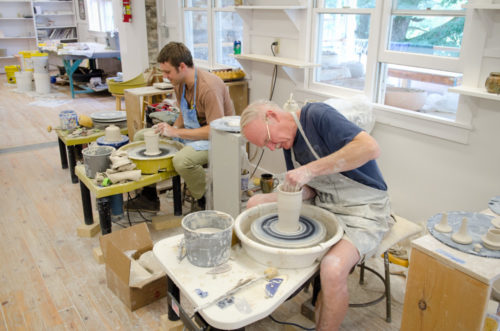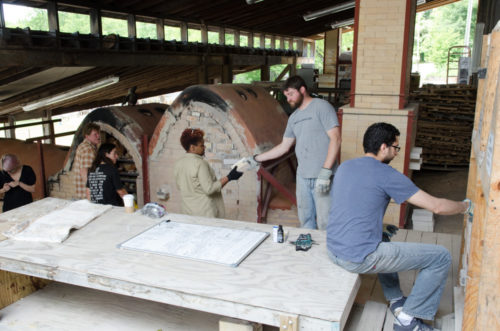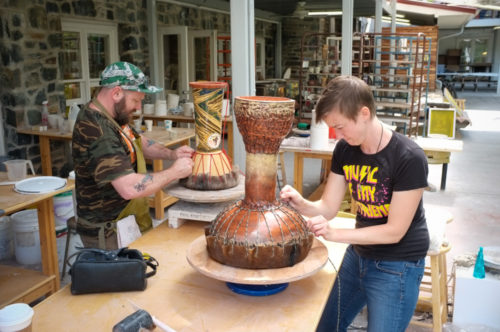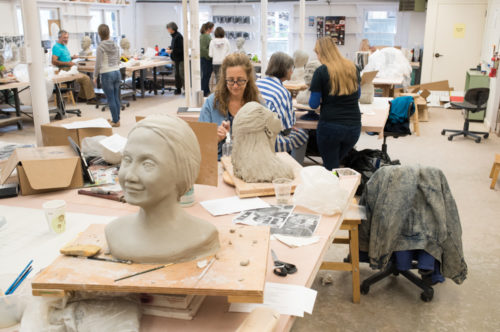Penland Clay Program


The Penland clay program offers beginning to advanced workshops in traditional and contemporary methods. Two studios provide space and specialty equipment for the exploration of concept and technique in ceramics. The scope of each workshop is determined by the instructor with input from our program director and support from our programming staff. Our versatile facility and high caliber artist/educators allow us to provide relevant programming in topics from functional pottery and glaze calculation to mixed media sculpture and everything in between. We strive for a balance of technical and aesthetic content and value all cultural and historical perspectives. We offer workshops that inspire and challenge students from curious beginners to accomplished professionals. Our programming is current in spirit and respectful of craft traditions.
The studios are very flexible, but are particularly well equipped for throwing, handbuilding, moldmaking and casting using a range of clay bodies and firing options. The range of workshop topics includes but is not limited to wheelthrowing, slab construction, altered wheel thrown pots, printmaking methods for clay, decoration and surface treatments, figure modeling, production design and marketing, drawing on clay, clay animation, teapot construction, slip casting, glaze formulation, integrating alternative materials, tiles and mosaics, kiln design and construction, and a variety of forming techniques for sculpture. Materials and techniques are combined in a myriad of ways, and instructors often ground technical exploration with conversations about historic and/or current context, design, or idea generation. Recent instructors include Cristina Córdova, Chris Gustin, Linda Christiansen, Kathy King, Gail Kendall, Kevin Crowe, Kyle Phelps, Kelly Phelps, Peter Callas, Kensuke Yamada, Mark Hewitt, Lindsay Pichaske, Simon Levin, Esther Shimazu, Paul Briggs, and Paul Andrew Wandless, among many others.
Our workshops take place in two well-equipped, well-maintained, and safe studios designed to accommodate diverse content and working styles. There are wheels or work tables for each student; two well-stocked glaze rooms; covered kiln sheds with electric, salt, soda, raku, and wood kilns; and covered outdoor work and meeting spaces.


Clay Studio
Penland has a two-storied clay studio that is well equipped to offer a variety of ceramic workshops. Wheel-throwing classes are held upstairs in “upper clay.” The downstairs classroom, known as “lower clay” or “deeper clay,” hosts handbuilding and sculpting classes.
Upper clay is approximately 30′ x 45′ and can provide space for up to 20 students. The classroom is adjoined by a large 21′ x 39′ glazing room. This glaze room includes a 22′ x 9′ glaze-mixing lab that is separately ventilated. Each student has a choice of an electric or kick wheel, plus a 32″ x 40″ x 11″ shelf unit for storage. The classroom includes four 4′ x 8′ canvas-covered tables, two 32″ x 48″ tables, and one 48″ x 34″ canvas-covered table. Seating is primarily stools with some wooden chairs with backs.
Lower clay originally housed Penland’s first wood studio. The classroom is approximately 30′ x 45′, with an additional glazing and plaster-working room that is 15′ x 39′. Each student has a 3′ x 6′ canvas-covered table with a storage shelf below. Lower clay can accommodate up to 18 students. Seating is manufactured chairs with backs and casters.
The clay studio has a newly renovated porch. This porch is two-storied and will offer a covered outdoor workspace for summer workshops. Besides the usual collection of electric kilns, outside lower clay will be an additional four 3′ x 6′ work tables and two wooden picnic tables for shared student use. The upper clay porch will house a clay recycling/processing area, a built-in bench for seating, and a couple of smaller work tables for shared student use.
Wheels and tables are assigned by a lottery process. Lower and upper clay share access to all the kilns. Both studios also share access to the specially ventilated glaze-making lab when needed; however, use of the glaze lab is restricted to instructors and studio assistants with some exceptions made depending on the class content. Both studios have two large sinks each with hot and cold running water. There are no lockers for storage of valuables. All lighting is fluorescent. The studio is open 24 hours a day, seven days a week.
Equipment
The following list of equipment will give you an idea of what to expect to find during your class here at Penland. Keep in mind that, although we do have all this stuff, if something is not necessary for your class, it may not be prepared for use. The equipment used by your class will be determined by your instructor and will be appropriate to the techniques covered in your class.
If you wish to use equipment in other studios during your session you must work with the instructor, studio assistant, and coordinator of that studio to request access to that studio. They will determine if your needs are compatible with their class’s activities and if you are able to work safely and independently with that equipment.
Our current selection of potter’s wheels:
6 Brent CXC electric wheels, reversible
16 Brent C electric wheels
5 Shimpo whisper wheels, reversible
1 Pacifica GT 400 wheel, reversible
2 Pacifica GT 800 wheels, reversible
2 Shimpo M-1 “Mini Master” electric wheels
4 treadle wheels
1 Brent motorized kick wheel
1 Lockerbie motorized kick wheel
2 Randall motorized kick wheels
The upper clay classroom includes:
8′ x 7′ x 2′ dry cabinet
25″ x 8′ canvas-covered cement wedging table
28″ x 78″ plaster wedging table
Bailey slab roller
North Star extruder
Bailey extruder
Bluebird clay mixer
Laguna spray booth
24″ x 24″ sand blaster
Selection of Plasti-bats and Masonite throwing bats; bat pins; banding wheels; studio buckets; towels
The glaze lab includes:
Amaco ball mill
1 Ohous digital scale
6 Ohaus triple beam scales
A dumb waiter (this is a big deal, people!)
The lower clay classroom includes:
18 – 3′ x 6′ canvas-covered tables
3 – 3′ x 6′ wooden tables
1 – 4′ x 8′ canvas-covered table
1 – 4′ x 8′ wooden table
1 – 3′ x 5′ canvas-covered table
8′ x 7′ x 2′ dry cabinet
Bailey slab roller
Huge plaster wedging table
Brent extruder
Plaster working area
Bandsaw
Assorted rolling pins; banding wheels; plaster and bisque molds; coddle boards; canvas work-boards; buckets
Kilns and Firing
Penland features a variety of kilns for a great learning environment. All our kilns are located outside both studios in two separate large kiln yards. Classes have varied curricula, and the type and number of firings are determined by the instructor. This is not a production studio, so please come with an open mind and a willingness to participate in group activities rather than with a list of personal projects to complete.
The kiln pad includes:
1 – three-chambered anagama/ noborogama hybrid wood kiln designed and built by potters Kevin Crowe and Dan Finnegan in 2013
1 – small-ish tube wood kiln designed and built by local potter Will Baker in 2017
1 – 65 cubic foot sprung arch/down-draft salt/soda kiln designed by local potter Shane Mickey in 2011
1 – 16 cubic foot cross-draft soda kiln designed by local potter Shane Mickey in 2009
1 – 16 cubic foot down-draft salt/soda kiln built by local potter Will Baker in 2015
1 – 65 cubic foot down-draft/sprung arch reduction kiln designed by local potter Tracy Dotson
1 – 15 cubic foot down-draft/sprung arch reduction kiln designed by local potter Tracy Dotson
1 – 2 cubic foot down-draft reduction test kiln designed by local potter John Britt
2 – 3′ x 3′ x 3′ fiber-lined raku kilns
All gas kilns listed are powered by propane, with Ransome venturi style burners that include a Baso valve safety system.
Our electric kilns include:
1 small test kiln
1 – 18″ round kiln
6 – 23″ round kilns
3 – 26″ round kilns
3 large oval kilns
Supplies and Materials
Students must purchase clay from the clay studio, and no clay can be brought in from the outside. This is to ensure that there will be no surprises when we open the kiln! Almost all of our clay comes from Highwater Clays in Asheville, unless the instructor requests a specific clay from another supplier. The price of clay is prorated to include glaze-making and firing costs: $18 for a 25 pound bag of stonewear or earthenware, and $21 for a 25 pound bag of porcelain. The average clay cost for a two-week wheel throwing class is $90 and for a two-week handbuilding class is $70. This will, of course, vary according to how much pottey or sculpture you make.
All classes have an additional studio fee that includes any special items purchased for and used solely by that class, a portion of the instructor’s demonstration clay, and any photocopies made for the class. The amount can vary depending on the class content.
There is an additonal hazardous waste removal fee charged to each student. In a two-week, this fee is typically $10 per student.
You should bring your own favorite tools, brushes, stamps, paddles, slip-trailers, sgraffito tools, sketchbooks, drawing supplies, apron, and towels. Carefully read the student materials list to see what other items you should bring. If you have any questions about supplies, please contact the studio coordinator at clay@penland.org.
Safety
On the first night or morning of your class, you are required to attend a formal safety talk and tour of the studio.
Please provide your own respirator or particle mask. If you like to use latex or rubber gloves while glazing, please bring your own. If you have your own safety glasses or kiln glasses, bring those, too. You can buy all these items in the Penland Supply Store.
You must wear a respirator while scraping kiln shelves, while handling any powdered material, and also while using the grinder or spray booth. You must also wear closed-toed shoes and non-synthetic fabric clothing while stoking the wood kiln or firing the raku kiln.
Drinking alcoholic beverages and/or smoking are not permitted in the studio or on the kiln pad. This includes drinking somewhere else and then coming into the studio to work. It also includes drinking while “watching” the kiln. The use of illegal drugs anywhere on campus is prohibited. Violation of these rules can result in an unexpected early trip home.
Penland’s septic system is not prepared to handle some waste materials that might affect our ground water. “Hazardous” at Penland can mean some things that are regulated but not necessarily labeled as hazardous by OSHA. Before disposing of anything, please consult the studio coordinator as to proper procedures.
Studio Clean-up
Students can anticipate that, in addition to their daily clean-up chores, there will also be a one- to two-hour all-class final clean-up of the clay studio. Group studio clean-up is mandatory. This will be scheduled during the last week of class, usually on Thursday, while kilns are cooling and there is no time available to make more work.
Session Schedule
Each session starts with an all-school meeting Sunday evening at 5pm followed by dinner in the Pines. Classes start Sunday at 8:30pm. The last day of each session, Friday, is reserved for farewells and an all-school exhibition of work created during your time at Penland. The workshop ends at lunch time Friday.
Come visit our studio any time! We’ll see you soon.
If you have questions, contact:
Studio Coordinator: Susan Feagin
Office: 828-765-2359 x 1325
E-mail Address: clay@penland.org
Work as a Figure Model at Penland
We are always looking for figure models in both the Drawing & Painting and Clay studios. Apply to be a model by filling out this form:
Figure Model Application
Please provide us with the best information by which to contact you and provide a letter of recommendation from someone who can speak to your professional work as a model in Word Doc or PDF form including their contact information.
We will contact you if there is a class that needs a model. Thank you.


